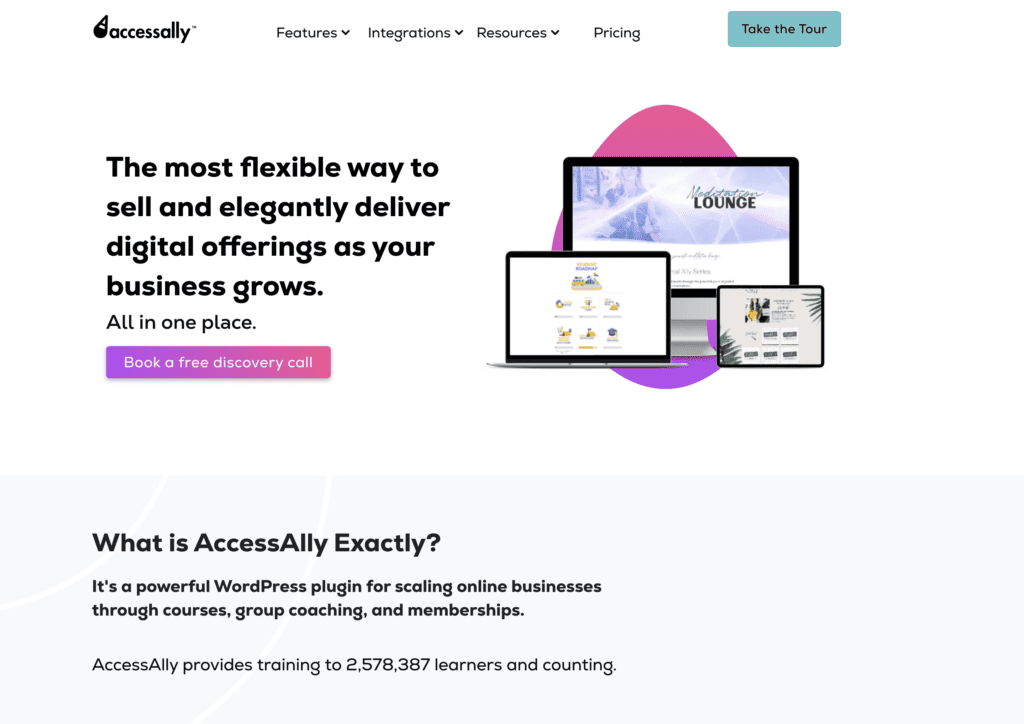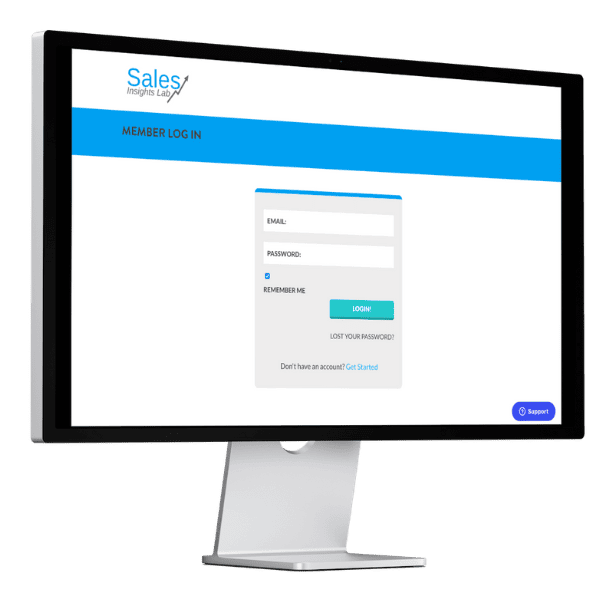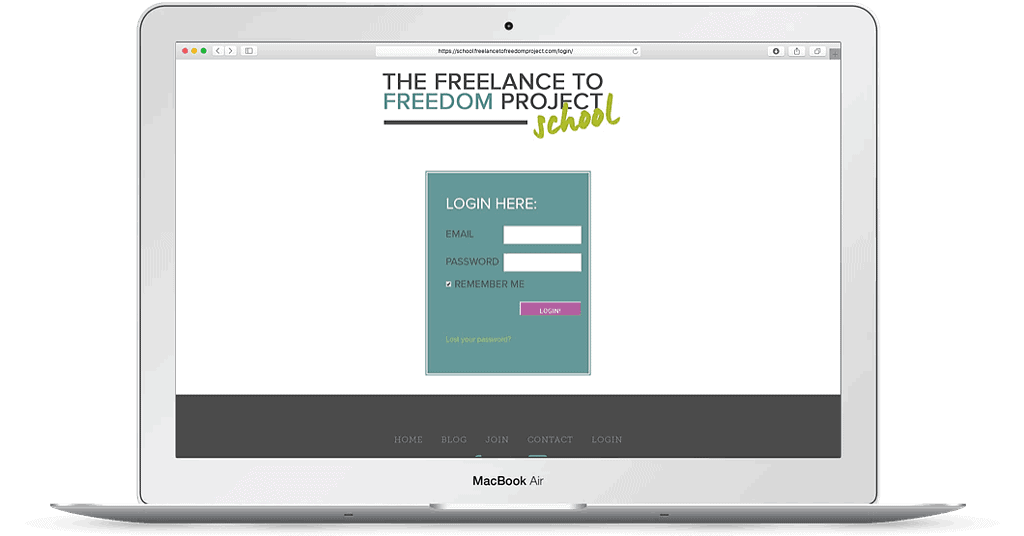Are you thinking of starting your own coaching business?
Coaching is a great way of sharing your knowledge and expertise with others.
You can focus on personal growth, team development, or business success as a coach, helping others make positive changes in their personal and professional lives.

Even if you are already successful at what you do, starting a coaching business from scratch can feel overwhelming.
You may feel like it is simply too much to do or that you don’t know where to start. Don’t worry – we’re here to coach you through it.
In this article, we’ll show you how to start your successful coaching business in 2024. We’ll also dig into some examples of others who have done it and what we can learn from them.
What is coaching, and how does it work?
Coaching is all about helping individuals and teams improve their performance by providing guidance, support, and feedback on set goals and challenges.
A coach can also help a client identify and set goals and challenges if they need direction.
You can help your clients identify strengths and weaknesses, set more realistic goals, develop action plans to achieve those goals, and help implement them effectively.
Coaching can take on many different shapes and forms, including live webinars, ebooks, courses, and membership programs, or one-on-one in-person sessions.
The clients you’ll encounter will be equally diverse, although coaching is typically used by individuals that want to improve their personal skills (e.g., public speaking, managing a team, improving a sales pitch) but also by organizations that want to build up their teams or upskill them.
Some of the benefits coaching clients will receive includes increased productivity, improved decision-making skills, improved employee morale, and more.
Coaching has become extremely popular among executives as a result. Forbes even calls it a key ingredient in professional success.
Coaching even helps companies retain good employees who might otherwise leave for another company that offers similar services or products by offering better training/coaching programs than their competition.
There are benefits for coaches, too.
You make a rewarding business out of building relationships and sharing knowledge that empowers people.
If you are serious about building a successful coaching company, you must generate value and share something that you are uniquely equipped to teach.
Types of coaching businesses
It’s hard to compile a definitive list of the different types of coaching on offer.
You could literally coach anyone on anything, from fitness to music, to business, to being more confident or creative.
Of course, there are a few methods of coaching that are more common or popular than others, including:
- Leadership coaching
- General business and marketing coaching
- Executive coaching
- Public speaking
- Teambuilding
- Personal development
- Life coaching
- Goal-setting and achieving
You’ll find that there’s a coach for just about anything people want to get better at… which means that you can start a successful coaching business by teaching any subject you’re good at.


Why should you start a coaching business in 2024?
There are plenty of coaching services around, which is why you may feel like you are a little late to the game in 2024. However, despite its popularity, coaching businesses are still growing.
According to the Research and Markets 2019 report, the online education market will grow to $350 billion by 2025.
The coaching industry has exploded since the COVID-19 pandemic. When we compared LinkedIn Search results between 2020 and 2021, we noticed a +314% increase in people referring to themselves with the title of “coach”.
That means that you have a lot of potential for growth – but also a lot of competition to contend with. It’s important to know exactly how you will highlight your business and stand out from this (growing) crowd.
Online coaching platforms are having an important moment in 2023 as people increasingly move online and think in global terms. If you want to start a coaching business, you have to think digitally.
According to Marketing and Business Coach Megan Hudson, digital coaching is one of the most important trends you’ll need to embrace.
She writes, “Digital/online coaching is becoming the mainstay of how coaching takes place compared with previous years.
Various surveys in recent years show dramatic growth in online coaching.
Virtual coaching increases accessibility, is more time-efficient for coach and client, creates higher levels of flexibility, and may make coaching more affordable.”
How do I start a coaching business?
There are several steps involved in setting up a successful coaching business.
This includes big strategic decisions, like choosing the right niche for your business and launching your marketing campaign to find your first clients, as well as smaller ones, including which payment gateway to use.
Again, this can seem overwhelming.
However, by following the steps below and using the tools we’ve recommended, the entire process feels much simpler, even for beginners.
1. Define your industry
If you have started investigating coaching, you probably already know what you’d like to teach.
If you have a number of different business ideas for potential skills to coach on and aren’t sure which specialty to focus on, consider your background in each, along with the demand for coaching in each of these areas.
You can use tools like Google Trends to identify the most popular fields, e.g. by comparing terms like “fitness coaching” and “relationship coaching” to see which one is most in demand.
2. Determine the qualifications you may need
Coaching is a lot more involved than just making money teaching skills.
Depending on your industry and specialty, you may need to back up your business with certifications and qualifications.
Nutritional wellness coaching may require certification, for example, so make sure that you educate yourself on the type of coaching you’re interested in so you can get certified if necessary.
3. Determine the niche where there’s room for your expertise
You will always have competition for your coaching business, which is generally a good sign because it means there’s demand.
However, it’s best to find a niche within your industry to focus on, so you’ll always stand out from the crowd:
- If you’re a fitness coach, you could focus on teaching men how to build up their physiques for competitions.
- If you are a career coach, you could teach men and women how to return to the workforce after staying at home to raise their children or provide care to a sick or elderly relative.
- Other people coach on topics that they’ve struggled with and overcome, such as addiction or trauma, so they become their own case study of a successful client.
Whatever coaching niche you choose, make sure you are an expert and position yourself accordingly.
4. Learn who your customers are
Once these steps are completed, get to know your potential customers by doing market research.
You can talk to them in person, promote surveys online, or read forums.
Figure out what your ideal clients look like, then take some time to find out what they care about and how to speak to them.
5. Create your brand voice and messaging
Take care when you choose your business name. Many coaches name their business after themselves, while others choose a name that speaks to their customer’s ambitions, e.g., “Financially Freed” or “Fit 4 Life”.
Choose what feels right.
If possible, use some of that user engagement by polling your potential clients on social media to see what resonates more with them.
Define how your business will sound early on and decide what your vision for its future is as it grows.
All this information will be vital for your marketing and should be present at every touchpoint with your customers.
6. Choose a business model
There is no industry standard for charging, nor are there standard payment methods you should follow.
If you are just starting out, you may want to set a lower price to reel in a few clients, and continue to increase your prices over time as you gain confidence and show results.
Instead, define what works best for your business and customers, and create a business plan on that basis.
You may decide to take on an indefinite amount of clients using general courses on topics in your industry, offer large- or small-scale group coaching, or take on just a few people for highly-personalized, one-on-one coaching sessions.
You can also use a mix and create add-ons for customers that want everything you have to offer.
7. Build a website
This is usually the part that intimidates most coaches. But if you want to be visible, you’ll need more than just a social media page.
If your social media page shuts down for a day, your website can still reach your customers and help potential customers find you.
Websites are also a great source of revenue.
Though coaching via courses hosted on websites like Udemy or Teachable is fine, it does cut into your take-home profits. Owning and selling your product on your own website will always give you more control.
You can create, design, and launch your website on WordPress using design templates from a theme or a page builder like Elementor.
WordPress is ideal to use for a website because it’s free, open source, and almost infinitely extendable using plugins.
It will be much more cost-effective and customizable long term than pay-per-month website builders like Wix.
Start with a portal website and build as you grow, but make sure that you set up payment options so that you can collect revenue. Clients can pay using popular methods like PayPal and credit if you sell on WordPress using WooCommerce or AccessAlly.
Next, add plugins to your website to capture emails for lead generation, manage your communities, social media, and anything else you may need.
A learning management system (LMS) is also helpful for managing your students and courses and sharing results.
If you’ve already started your community online (on a social media site like Facebook, for example), you can easily move them to your own website and keep promoting your online coaching business to existing customers or fans.


8. Create products and pricing
Once you’ve defined what kind of coaching you’ll focus on, you can package your offering into products for your potential customers to choose from.
This will help you define pricing and pitch it to leads according to their needs and ambitions.
Pricing will depend mainly on your target audience and the way they value what you are offering.
Always take your costs and expenses into account.
You should decide whether you’ll charge once per product or if you’ll run a membership with a continuous stream of content for your coaching clients.
9. Market your offer and generate leads
Marketing is a key part of building a successful coaching business.
You could have the perfect background and the ideal product, but with a faulty marketing strategy, your business just won’t get off the ground.
Create marketing material (like visuals, copywriting, and comparison charts) that your potential customers will need at every stage of the buyer’s journey based on your customers’ needs and most pressing pain points.
You’ll also need to decide which types of marketing methods you’ll focus on to continually generate and nurture leads.
This could include paid ads on Google and social media, email marketing, retargeting visitors with display ads, SEO content, or referrals from an affiliate marketing program, among many others.
These channels will deliver a steady stream of leads without additional effort after the campaign has been set up.
10. Nurture leads
Once you’ve captured these leads, you need to convert them into paying customers.
Use your marketing content to remind new client prospects that you understand their pain points and entice them to buy a full coaching package to enjoy the full benefit of your guidance.
Email marketing automation is a great way to nurture leads and convert a constant stream of leads over time. If you do this well, your business is sure to succeed.
11. Coach your first clients (and request feedback)
Once you’ve converted a few leads into customers, you can start coaching. Always request feedback along the way so you can make improvements and share positive testimonials on your website.
Make sure that you document the entire coaching process.
This will help you understand how customers may feel at every stage. Note down any frequently asked questions you get from your clients, and use these insights to improve your offering.
A successful coaching business is one that’s always moving the goalposts and improving.
Setting up a successful coaching business using AccessAlly
We’ve already covered the way that using different plugins and online tools will extend the functionality of your website, but there is a learning curve.
You need to master the ways the different tools work (and if and how they work together).
This involves time-consuming trial and error that most coaching entrepreneurs do not have the time for.


Luckily, there is a solution. AccessAlly is an all-in-one WordPress plugin designed specifically for coaches building courses and membership sites.
AccessAlly offers numerous advanced features you’ll need for your business, including giving you the ability to sell digital downloads and create engaging learning experiences.
You can also integrate with popular tools like Zapier to automate tasks.
You can connect your site with useful apps like Mailchimp, or send emails directly from the plugin, to keep in touch with clients and nurture your leads.
In other words, AccessAlly allows you to build, launch, and scale your business, making it the perfect solution for any aspiring coaching business owner looking to take their small business to the next level.
Instead of trying out multiple plugins (each requiring updates and subscription fees that quickly add up), you can use AccessAlly to do the work of dozens of plugins.
AccessAlly will decrease the amount of work it takes to set up your coaching business, learn how to use each tool and plugin, and integrate all of them into a single, cohesive system.
AccessAlly replaces a wide range of different coaching tools and plugins, including:
- LMS
- Membership
- Community Management
- Affiliate Marketing tools
- Member Directory
- Video courses
- Quiz creation
- Shopping cart for payments
But AccessAlly does a lot more. We understand what coaches need.
They offer many unique features, like gamification, personalization, and member management, and really focus on making it easier for coaches to build (and then scale) their business.
Customer support is first-class, making it easy for anyone to log in and access course content (even beginners).
Successful coaching businesses using AccessAlly
Building a successful coaching business in 2023 is more accessible than ever.
Instead of building your own patchwork of plugins to reach the right formula, AccessAlly offers coaches the right mix of tools and enough support to launch a successful coaching business from the get-go.
Here are some coaches who have built successful businesses using AccessAlly:
Marc Wayshak, Sales Insights Lab


Marc Wayshak is a sales strategist, author, and founder of the corporate training business, Sales Insights Lab.
Marc created the Game Plan Selling System™, a data-driven and science-based sales methodology that balances both qualitative and quantitative research with proven results in client companies.
Marc coached using a membership-based model and used AccessAlly to successfully triple the number of members using his training.
Marc attributes his success to AccessAlly’s ease of use and professional design as well as its 1-click upsells and gamification.
Leah Kalamakis, Freelance to Freedom Project


Leah Kalamais founded the Freelance to Freedom Project to help creatives build and scale a freelance service-based business. As a coach who teaches people to grow their businesses, scalability was a must-have for Leah.
Leah uses AccessAlly as a “school,” or the hub, for all of her online courses.
Before using AccessAlly, Leah’s courses were scattered across several domains. Now, she keeps all of her content on a single platform, making it easier for customers to find and choose courses.
She also used the plugin to avoid the burnout she felt from constant course content creation and is now upselling customers on more than one course with ease.
Take the first steps to start your own successful coaching business
2024 is a great time to build your successful coaching business. The industry is growing, and there are hundreds of different areas of specialty you could explore and teach.
All you need is to pick the niche for your coaching skills, build your site and choose your marketing channels.
Tools like AccessAlly make it even easier. AccessAlly was built for coaches.
It comes with advanced features that are perfect for confident and experienced users, but a simple and easy-to-use interface that makes it easy for beginners to get started.
Built-in integration with tools like Zapier makes it even more convenient, so you don’t need to build separate integrations on your own. If you want to start your coaching business, start with AccessAlly.
Download AccessAlly and start selling today.

